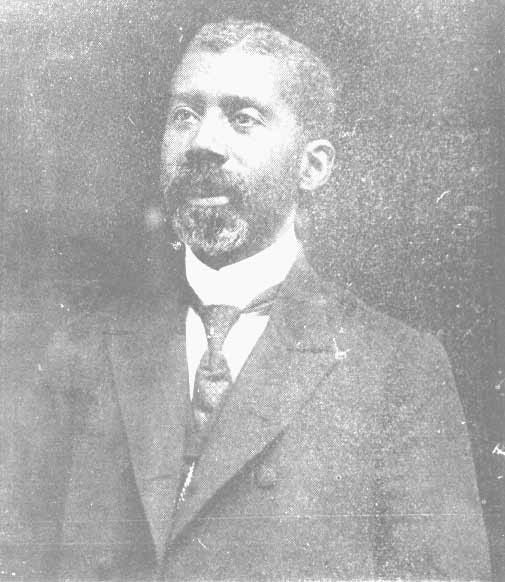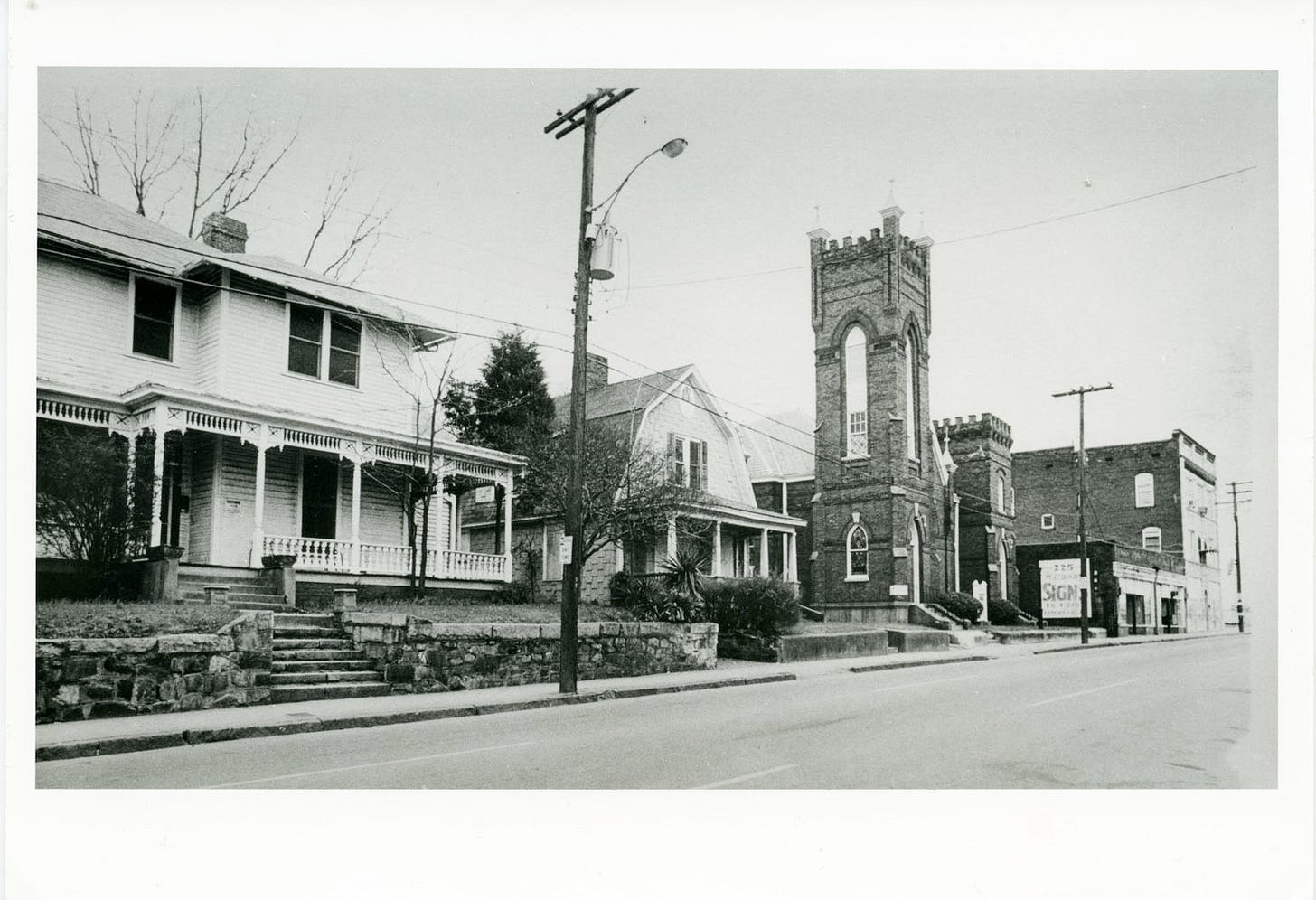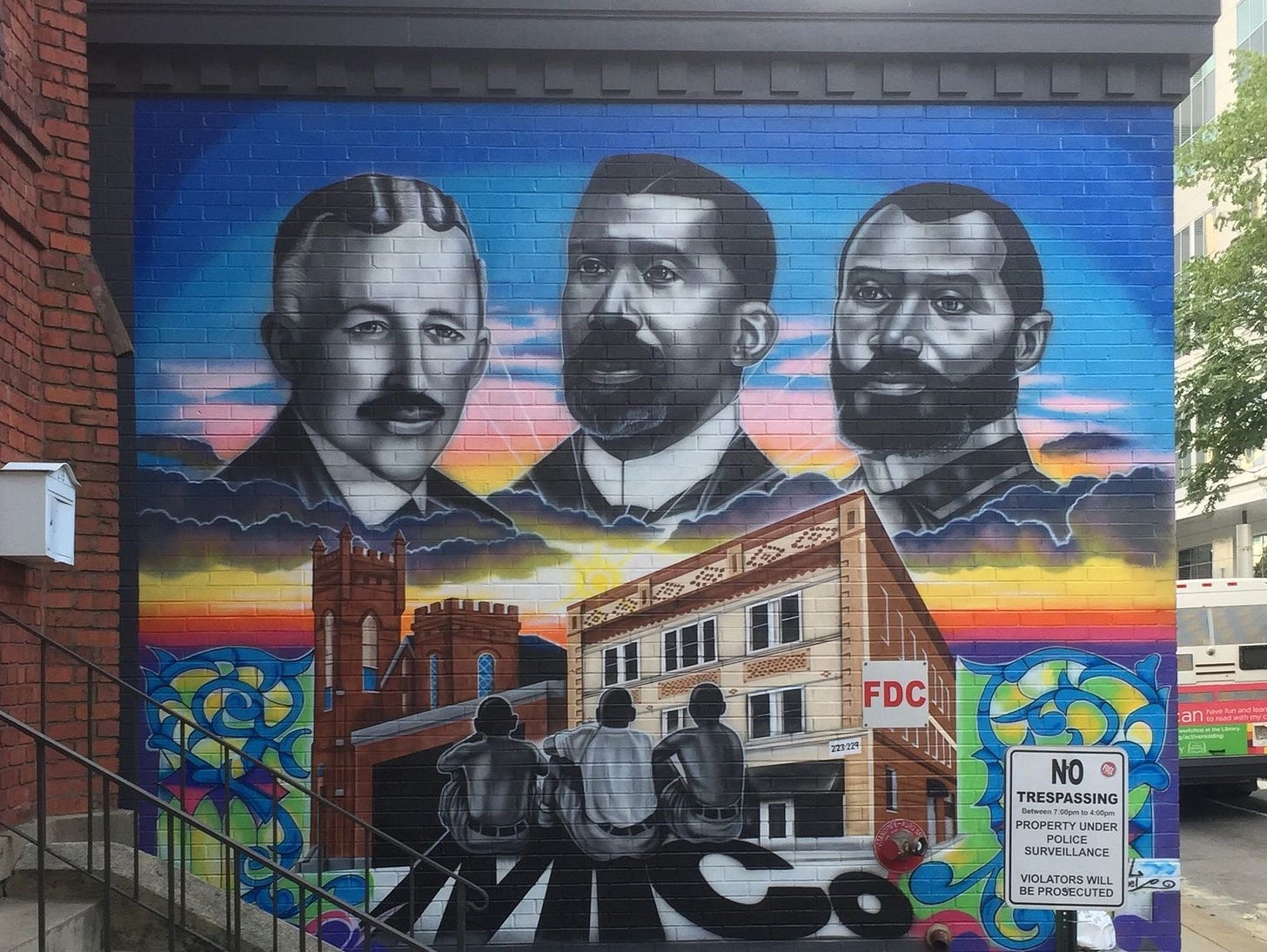Historical Heavyweights: A 19th century trailblazer in education, medicine, business …
Plus the news of the week: CMS enrollment flat — Cheri Beasley zooms ahead in campaign fundraising — early AvidXchange investors set to cash in — reality show planned for Charlotte FC
Good morning! Today is Saturday, October 9, 2021. You’re reading The Charlotte Ledger’s Weekend Edition. You might enjoy listening to our audio version on Spotify 🎧.
Need to subscribe — or upgrade your Ledger e-newsletter subscription? Details here.
Today’s Charlotte Ledger is sponsored by Providence Day School, which exists to inspire a passion for learning, a commitment to personal integrity and a sense of social responsibility. Admissions open houses are Oct. 28 for grades TK-5 and Nov. 14 for grades TK-12. Click for details.
Just two decades after the Civil War, J.T. Williams founded a school and became one of N.C.’s first Black surgeons. Then he became a politician and a diplomat.
Editor’s note: You see their names on street signs or parks, but who were some of the big-name people from decades ago who shaped Charlotte? They have fascinating stories, and on Saturdays in October, we’re sharing them with you.
by John Short
John Taylor Williams was a trailblazer who lived a life of firsts in professional and political pursuits. J.T. Williams’ life reads like an almost comical list of Forrest Gump-esque achievements that unfold chronologically in increasing degrees of impressiveness.
Williams was born in Cumberland County in central North Carolina in 1859 to a free Black man who strongly emphasized the importance of education to a young J.T. The message clearly stuck, as J.T. would go on to build a resume that included:
➡️ Founding the first school for Black children in Charlotte
Williams moved to Charlotte in 1882 after teaching elementary school for a few years after college. At the time, post-Reconstruction Charlotte had virtually no infrastructure for its Black citizens. Williams would become a catalyst for many of the institutions in the late 1890s that served as the backbone of Charlotte’s growing Brooklyn neighborhood.
The first of these institutions was the Myers Street School, Charlotte’s first public school for Black children. Williams was part of a group that established the school in an old tobacco barn on 5th Street, and he would teach at the elementary school for three years.
➡️ Becoming one of the first three Black doctors licensed to practice in North Carolina
After his teaching stint, Williams left Charlotte in 1883 to attend medical school at Shaw University in Raleigh. Williams graduated in 1886 to become one of the first three Black doctors licensed in the state of North Carolina. His career in medicine brought him back to Charlotte, where he established his own practice and served as a surgeon at Union Hospital and Good Samaritan Hospital (where Bank of America stadium sits today). Williams also served as a member of the Board of Health of Mecklenburg County.
J.T. Williams (1859-1924). (Photo courtesy of Robinson-Spangler North Carolina Room, Charlotte Mecklenburg Library)
Let’s reflect on this for a moment: At this point, J.T. is 29 years old. He has founded a school, graduated college twice, was a doctor and educator, captain in the N.C. State Guard (he did this too btw), served on the County Board of Health and broke racial barriers in the medical field two decades after the end of the Civil War. That’s a lifetime of accomplishments already before his 30th birthday … but there’s more to get to. OK, let’s keep going.
➡️ Serving as a successful local politician in the City of Charlotte government
In the midst of this medical success, Williams dipped his toe into Charlotte civic life, and was elected to the city’s Board of Aldermen in 1889 and 1891. (At one point during this era of North Carolina politics, Black men held three of the 12 seats on Charlotte’s Board of Aldermen. This representation of Black citizens in local governments was not uncommon in the state during the decade of “fusion politics,” which culminated in a white supremacist revolt in Wilmington in 1898.)
➡️ Representing the United States internationally as a diplomat to Africa
Williams’ reputation as a politician extended beyond Charlotte, and in 1897, he was appointed by President William McKinley to serve as the U.S. consul to Sierra Leone, where he served until 1907 as one of the United States’ first Black diplomats.
➡️ Establishing Charlotte institutions that stand to this day on Brevard Street
Upon his return to Charlotte, Williams cemented his legacy as a Charlotte titan, serving as president of the Queen City Drug Co. and growing his own real estate and farming investments. Williams was a founding member of the Grace AME Zion Church, a trustee of the AME Zion Publishing Co. and an original investor and board member of the Mecklenburg Investment Co.
The Grace Church and Mecklenburg Investment Co. were prominent buildings along the “Black Wall Street” of Brevard Street in Brooklyn, and in 1921, at the same time as the construction of the MICo building up the street, Williams built a three-story house just steps away from the Grace Church.
J.T. Williams’ home. (Photo courtesy of Charlotte Mecklenburg Library)
In June of 1924, Williams suffered a stroke during services at the Grace A.M.E. Zion Church and died later that evening in his home two doors down. Williams is buried in Pinewood Cemetery.
Williams’ legacy pops up throughout Charlotte, but he’s still an underrated character in Charlotte’s story. The Charlotte school system put his name on a middle school in 1962, and today, there is J.T. Williams Montessori school for grades 7-12 in the Druid Hills neighborhood.
Perhaps one of the most photogenic and recognizable tributes to Williams is the mural by Abel Jackson that is painted on the wall of Studio 229 on Brevard, just outside the Grace Church, just steps from his home in the neighborhood he spent his life helping to build.
This mural on Brevard Street uptown depicts Williams (center) along with Grace founder Thad Tate (left) and W.C. Smith, the founder of Charlotte’s first Black newspaper, the Charlotte Messenger.
John Short is a freelance writer and co-host of The Charlotte Podcast who loves digging up Charlotte’s past and pondering its future. Say hey when you see him on the streetcar.
Today’s supporting sponsors are Soni Brendle…
… and Payzer:
This week in Charlotte: River District plans roll out, fallout after protest at Olympic High, hot new development ordinance released🔥
On Saturdays, The Ledger sifts through the local news of the week and links to the top articles — even if they appeared somewhere else. We’ll help you get caught up. That’s what Saturdays are for.
Education
CMS enrollment flat and less than estimated: Enrollment at Charlotte-Mecklenburg Schools this year is almost the same as last year and below CMS projections, the district said late Friday. CMS figures show enrollment at 140,406, or 334 more students than last year. The school system had projected nearly 144,000 students. At the beginning of the 2019-20 school year, before the pandemic, CMS reported 146,000 students. The numbers suggest that students who left CMS during Covid for private schools or homeschooling largely have not returned this year. Because staffing is tied to enrollment, CMS says there will be “some adjustments” to staffing but that “all current teaching and instructional support positions will be maintained.”
Olympic High protest: (Observer) At least two Olympic High School varsity volleyball players were handed a one-game suspension because they participated in a student-led walkout protesting sexual violence. The protest, held Oct. 1 at the school, partly centered on the case of a fellow student-athlete, who was allowed to continue playing football for Olympic High after being criminally charged with a sexual felony. On Friday, Charlotte-Mecklenburg Schools Superintendent Earnest Winston told reporters that he wants students “to be inquisitive and have your voice heard but I wanted to do it in the appropriate way.”
Students held back: (WFAE) Almost one-third of last year’s North Carolina third graders were held back this year because they failed 2021 reading exams. A report presented Wednesday to the state Board of Education showed how the impact of the pandemic has played out under the state’s Read to Achieve program, which is designed to get all children reading well by the end of third grade.
Politics
Beasley leads in 3Q donations: (Observer) Democratic Senate candidate Cheri Beasley raised much more than her competitors in the third quarter, taking in $1.5M. That’s more than Jeff Jackson ($900,000) and Erica Smith ($128,000).
Government center opens to public for meetings: (WSOC) Beginning Oct. 18, the Charlotte-Mecklenburg Government center will reopen to the public for meetings of Charlotte City Council, the Mecklenburg Board of County Commissioners and Charlotte-Mecklenburg school board. The building closed to the public in mid-August because of a spike in Covid cases.
Legislative maps: (WFAE) North Carolina legislators started drawing new legislative maps this week, as the state kicks off a two-week effort to create new congressional districts and state House and Senate maps based on population data from the 2020 census. The state is getting a 14th seat in the House of Representatives, and much of the attention is on where that seat will be.
Local news
Vaccine required at American: (Dallas Morning News) American Airlines says its employees must be vaccinated under new federal guidelines for government contractors. “It is clear that team members who choose to remain unvaccinated will not be able to work at American Airlines,” company executives wrote in a letter to employees. Charlotte is American’s second-largest hub.
Grants for childcare centers: (WFAE/AP) North Carolina childcare providers can begin applying next week for $805M in grants funded with the state’s Covid relief money. Grants will range between $3,000 and $60,000, and all private, licensed early care and learning programs, including those inside homes and at churches, can apply online.
Business
River District about to start: (Ledger Wednesday 🔒) Crescent Communities and the city provided the most detail yet of plans for The River District, a 1,400-acre development between the airport and the Catawba River. It has been in the work for six years, and construction on the first phase could start by the end of this year. We’ve got all the details.
A big tech bet that is paying off: (Ledger Friday 🔒) Nearly 20 years ago, a group of several dozen Charlotte business leaders put money into a tech start-up called AvidXchange. Now, the company is on the verge of going public, which is good for those investors and for the city.
Sports
Hornets preseason underway: The Charlotte Hornets started playing their preseason schedule this week, including a home opener Thursday.
Charlotte pro soccer reality show: (Biz Journal) Reality TV producer Mark Burnett, known for hits including “Survivor” and “Shark Tank,” is teaming up with Charlotte’s new pro soccer team, Charlotte FC, on a reality show that will “chronicle the competition for a spot” on the team’s roster.
From the Ledger family of newsletters
Liquor shortage hits restaurants: (Wednesday 🔒) Charlotte restaurants are growing frustrated that they are unable to find the brands and types of liquor they need, as shortages continue in North Carolina. Some are driving to multiple liquor stores and reprinting menus.
Traffic deaths (Transit Time). Traffic deaths are on the rise in Charlotte and nationally, and the City Council is exploring options on how to stem the increase. But at a discussion on Monday, council members barely talked about Charlotte’s huge drop in traffic enforcement.
Myers Park QB who went on to NFL: (Ways of Life 🔒) Rick Arrington was the nation’s top-rated high school quarterback and went on to play with the Philadelphia Eagles. At his funeral, granddaughter and actress Dakota Fanning called him “the baddest man that ever lived.”
Hangry at the airport: (Friday 🔒) Finding hot meals on a tight turnaround at Charlotte-Douglas International Airport is hard at certain times of the day, with staffing shortages forcing many restaurants to reduce their hours. The airport is hosting job fairs in an effort to hire more workers.
Unified Development Ordinance released: (Friday 🔒) The city’s planning department released the first draft of a new development ordinance that will regulate everything from zoning to tree protection. It’s more than 600 pages.
Firebirds liquor display: (Monday) A new Firebirds restaurant in Huntersville in caught in a liquor shortage Catch-22: It can’t get enough bottles for a lighted bar display, but it can’t use empty bottles, either, because of the risks of running afoul of North Carolina’s alcohol regulations.
Independence bus lanes: (Wednesday 🔒) The express bus lanes in the middle of Independence Boulevard remain unused, and it might be a while before they’re put back into action. Part of our “You Ask, We Answer” series that responds to reader development questions.
Mick Jagger does more ordinary things: (Friday) A week after wowing Charlotte by drinking a beer at a bar in Plaza-Midwood, Mick Jagger went to Pittsburgh and ate dinner at a seafood restaurant and relaxed at the city’s botanical gardens.
Need to sign up for this e-newsletter? We offer a free version, as well as paid memberships for full access to all 3 of our local newsletters:
➡️ Learn more about The Charlotte Ledger
The Charlotte Ledger is a locally owned media company that delivers smart and essential news through e-newsletters and on a website. We strive for fairness and accuracy and will correct all known errors. The content reflects the independent editorial judgment of The Charlotte Ledger. Any advertising, paid marketing, or sponsored content will be clearly labeled.
Got a news tip? Think we missed something? Drop us a line at editor@cltledger.com and let us know.
Like what we are doing? Feel free to forward this along and to tell a friend.
Searchable archives available at https://charlotteledger.substack.com/archive.
Social media: On Facebook, Instagram, Twitter and LinkedIn.
Sponsorship information: email editor@cltledger.com.
Executive editor: Tony Mecia; Managing editor: Cristina Bolling; Contributing editor: Tim Whitmire, CXN Advisory










